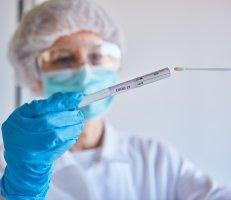Sexually Transmitted Infections
NewMed Immediate Care
Urgent Care located in Rolling Meadows, IL
Sexually transmitted infections often don’t cause symptoms and may lead to long-term complications without treatment. With testing at NewMed Immediate Care in Rolling Meadows, Illinois, Ruchir Thakkar, DO, and the team can identify infections and provide the appropriate treatment. Call NewMed Immediate Care for testing, or book a visit online today.
Sexually Transmitted Infections Q& A
What are sexually transmitted infections?
Sexually transmitted infections (STIs) are bacterial, viral, or parasitic infections that spread through sexual contact. You can get them from oral, anal, or vaginal sex, and they can infect any of these areas too. While many people use STIs and sexually transmitted diseases (STDs) synonymously, others consider STDs to be STIs that cause symptoms.
The broader category of STDs includes diseases that come after certain STIs as complications, such as pelvic inflammatory disease and acquired immunodeficiency syndrome (AIDS). The list of STIs includes:
- Gonorrhea
- Chlamydia
- Herpes
- Genital warts (human papillomavirus)
- Syphilis
NewMed Immediate Care offers testing for various STIs in both offices. Some are most easily detected with swab tests while others require blood testing or urinalysis.
When should I get tested for sexually transmitted infections?
Regular testing for STIs is imperative for detecting infections even when they don’t cause symptoms, so you can stop their spread. While you can minimize your risk of getting STIs by using condoms for protection, staying celibate, or remaining with one long-term mutually monogamous partner, you should get STI screenings when:
- You have a new sexual partner
- You have multiple sex partners
- You’re pregnant
- You share needles or other drug equipment
- Symptoms occur, such as irritation or unusual discharge
Depending on your gender, sexuality, and certain circumstances, the team might recommend getting yearly tests for specific STIs. For example, you should get tested yearly for gonorrhea and chlamydia if you’re a sexually active woman under 25, and if you’re a sexually active gay or bisexual man. Everyone between ages 13 and 64 needs at least one HIV test too.
How are sexually transmitted infections treated?
STI treatment depends on your diagnosis. While some infections are curable, others are not and require long-term management to avoid complications.
Antibiotics can clear up bacterial infections like gonorrhea and syphilis, but you must complete the entire course to get rid of the infection. Others respond to other oral and topical medications.
The team at NewMed Immediate Care might advise you to avoid sexual contact until you’ve completed your treatment for an STI, even if the symptoms go away early.
Call NewMed Immediate Care for sexually transmitted infection testing and treatment today. Otherwise, schedule an appointment online.
Services
-
 COVID-19 Testingmore info
COVID-19 Testingmore info -
 COVID-19 Antibody Testingmore info
COVID-19 Antibody Testingmore info -
 DOT Physicalsmore info
DOT Physicalsmore info -
 Primary Caremore info
Primary Caremore info -
 Physicals - All Agesmore info
Physicals - All Agesmore info -
 UTImore info
UTImore info -
 Asthmamore info
Asthmamore info -
 Telemedicinemore info
Telemedicinemore info -
 Wound Caremore info
Wound Caremore info -
 Abscessmore info
Abscessmore info -
 Women’s Healthmore info
Women’s Healthmore info -
 Coughmore info
Coughmore info -
 HIVmore info
HIVmore info -
 Vaginitismore info
Vaginitismore info -
 Sexually Transmitted Infectionsmore info
Sexually Transmitted Infectionsmore info -
 Chlamydiamore info
Chlamydiamore info -
 Gonorrheamore info
Gonorrheamore info

















